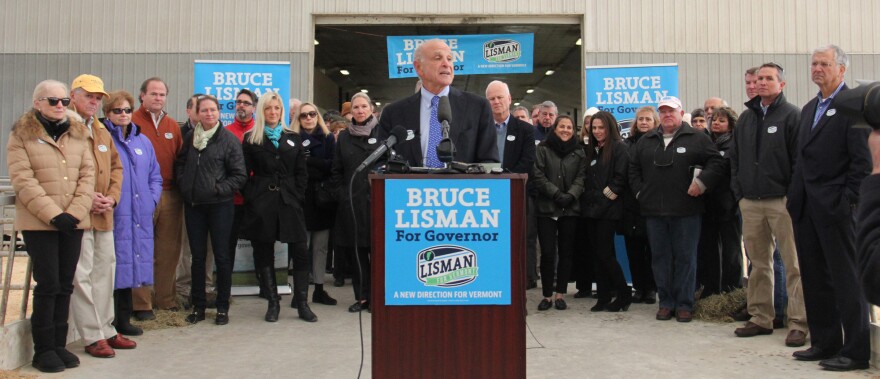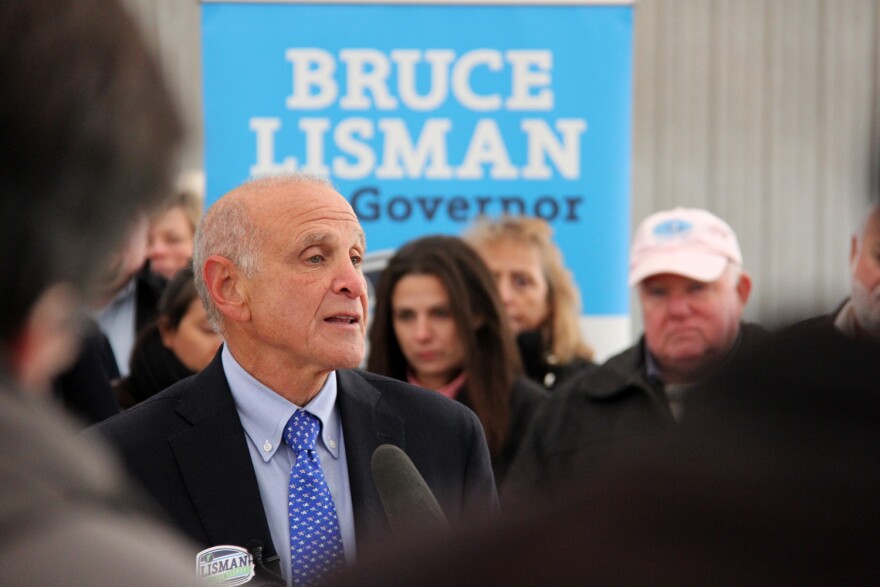Republican Bruce Lisman launched his campaign for governor Monday morning surrounded by family, supporters and calves.
In a calf barn at the Green Mountain Dairy farm in Sheldon, the former Wall Street executive said his campaign is essentially a response to the nearly five years of Gov. Peter Shumlin’s administration.
“I decided to run because I thought – honestly I thought this administration was so remarkably and relentlessly incompetent that we should do something,” Lisman said.
Lisman outlined some of those solutions Monday.
One of the few rounds of applause at Lisman’s kickoff came when he vowed to slow down renewable energy development in Vermont.
“The invasion of large wind and solar projects into our communities has raised important issues that literally have changed how we think about renewables,” he said. “We need to balance the value of renewables with the right of local people to control the future of their own towns. We need to tell Vermonters what the cost will be to meet well-intended long-term energy goals, and we need to be honest about what impact large projects will have both on climate change but on also our own environment, and that’s why we need a two-year moratorium on all new industrial renewable projects now.”
Lisman also said the state’s goal of a 90 percent renewable energy portfolio by 2050 “should be part of the discussion” as well.
“For one thing, I think we need to know if we get to that level, what have we accomplished and what price do we pay if we pay a price, and along the way we ought to decide what it means. How much of our land will be used for exactly what? Who might pay for that, but who might be living with it? And how do we decide where it is?”
"The invasion of large wind and solar projects into our communities has raised important issues that literally have changed how we think about renewables." - Bruce Lisman
Lisman suggested a regulatory system similar to the Act 250 system that regulates commercial development, but for renewable energy.
Questioned about his plan, Lisman said action on climate change “is a very good thing to do” and said some of the state’s other efforts could be improved.
“I don’t think we have a very efficient weatherization program,” he said. “I think we could do a lot better on that just for starters. I think we can continue to educate people about use of energy. And mind you we have a very small carbon footprint here, so we’re not going to change the world, but I think we should do our part.”
Lisman also said his administration would cap state spending at a 2 percent annual growth rate for three years and repeal Act 46, the state’s new school consolidation law.
“It’s the best thing we can do for education today,” he said of the repeal. “Mandatory consolidation of our schools is a really bad idea. It’s a terrible law that will raise your property taxes, take away local control, and eliminate school choice. It’s a package of misery that’s setting on Vermonters.”
Lisman's policy agenda came as he worked to craft the narrative of a business-savvy outsider who will bring change to state government.
At his campaign launch, Lisman sought to distance his career at Bear Stearns and J.P. Morgan from the global recession of 2008.

“Neither I nor the businesses that I ran had anything to do with any of the financial problems you read about in the press,” he said. Lisman said more important than his job is what he learned from it.
“I built a large business out of a small mediocre business. I led and managed people. I focused on talent. We built backbone technology - we built elegant technology projects. I dealt with clients to make them feel like we could offer the best that they could find just as a governor would tell the people of Vermont they’re getting the best that we have to offer.”
"if we continue to elect the usual people, we'll be lucky to get the usual results." - Bruce Lisman
It was clear he wasn’t talking about Shumlin offering the best the state has. Lisman repeatedly named Shumlin and his administration as a cause for problems - from the state budget to property taxes to renewable energy policy - and emphasized that “if we continue to elect the usual people, we’ll be lucky to get the usual results.”
When asked about fellow Republican Phil Scott, that criticism – same people, same results – was Lisman’s way of contrasting himself with the lieutenant governor. It was also his criticism of Shumlin and his allies.
In effect, Lisman’s kickoff didn’t sound like the start of a Republican-versus-Republican campaign that will shift gears after the primary, but the start of an outsider run against establishment politicians of any party.
John Powell, the chairman of the Board of Trustees at the University of Vermont Medical Center, introduced Lisman. Powell, too, sought to distance Lisman from politics as usual.
“Bruce’s solutions for improving Vermont’s directions are not limited by the concepts of a single political party,” he said. “I know that Bruce’s leadership as governor of Vermont will reach across our state to include the best solutions for a healthier Vermont.”





